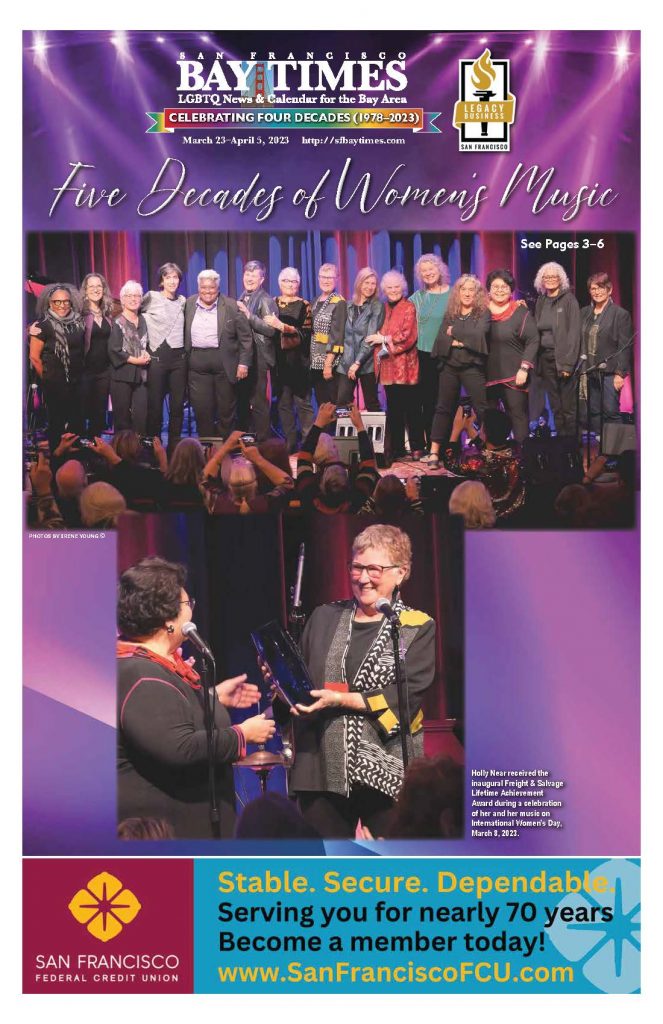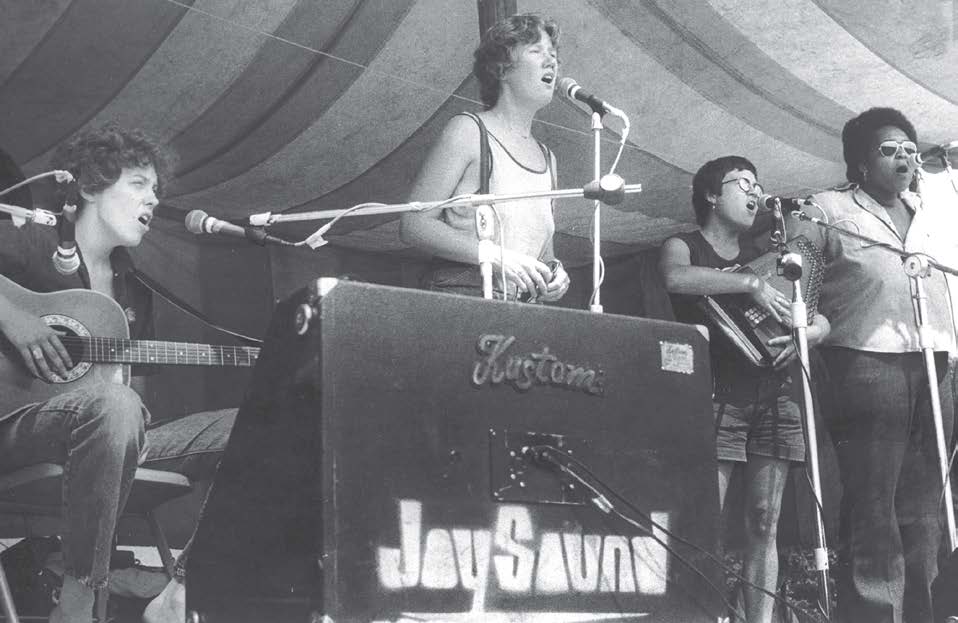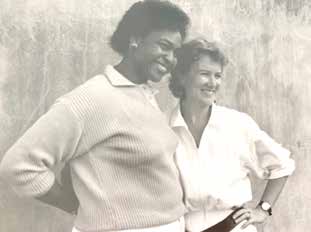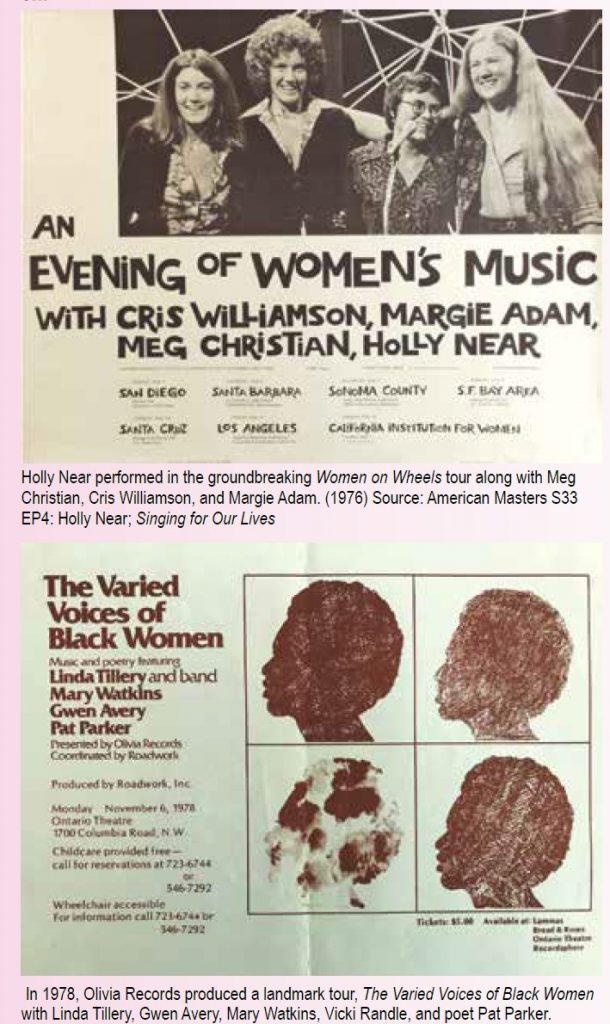
Just days after the sold-out International Women’s Day Celebration of Holly Near, the San Francisco Bay Times had the pleasure of catching up with Near, who is not only a world-class musician but also a thoughtful and skilled conversationalist as well as storyteller. For those who have admired her and her music over the years, this comes as no surprise. As she says, “I do not separate my music from my heart nor do I separate my ideas from my daily life. I open myself up to learning as much as I can about humanity and this mysterious life experience, but I do not relate to political work as a series of ’causes.’ Moment by moment, I integrate what I learn into my personal life, personalizing my politics. It is from this personal place that I write my songs.”

We savored every moment with her, especially given the challenges of the prior year when she suffered a series of health problems, including anal cancer—she previously was diagnosed with breast cancer in 2014—and a stroke. (She goes into detail about this at her website.) She is now in remission, and is as fiery as ever. Her passion for life, music, and more are palpably evident.
San Francisco Bay Times: When we originally envisioned coverage of your career, as well as women’s music, we thought of the past 50 years. So often women’s music is linked to second-wave feminism. But you reminded us that such music goes far beyond the past five decades. We thought about you speaking in earlier interviews about music played by your parents in your family’s home on a Northern California ranch. When do you think women’s music first evolved, and who were some of the key influential artists, including those who have influenced your own music over the years?
Holly Near: There have always been strong women artists who express their strength through music and the arts. Whether they were celebrated or punished for their ideas is part of that story. I have always thought “Women’s Music” was a code term for music rooted in feminism/lesbian feminist. As women developed politically, feminists had greater receptivity to investigating racism, class, age, health, disability, global peace, corporate and military industrial complex. That is a lot to take on, but amazingly, some took it on with extraordinary clarity and creativity. Even if a song wasn’t “blatantly political,” the song resonated from a growing community of woman identification. And, of course, there were very specific songs like “Leaping Lesbians” by Sue Fink (first recorded by Meg Christian), “A Woman in Your Life” by Alix Dobkin, “Sugar Mama” by Gwen Avery, “Freedom Time” by Linda Tillery, “Girl on The Road” by Ferron, “Amazon Women” by Maxine Feldman, and on and on.
All of these songs can be heard on an historic archival website called Because of a Song: https://becauseofasong.com/ . Two versions of “Amazon Women” are on the site, the original and a remake with Judith Casselberry.

San Francisco Bay Times: Moving more to the 1970s in time, Oakland seemed to be a beacon city for yourself and so many other groundbreaking artists. Why do you think this East Bay city, in particular, became such a destination and do you think it retains that spirit?
Holly Near: The East Bay had Mills College and Laney College. It had Mama Bears and The Brick Hut. It had Linda Tillery and The Berkeley Women’s Music Collective. Each new artist and activist who found their way to Oakland built something. So then they have June Millington and Gwen Avery and Judith Cassleberry. Then Olivia (Olivia Records and now Olivia Travel) moved up from Los Angeles. Which brought Meg Christian and Teresa Trull. And Iris Films. And Redwood Records. Then Pat Parker and Judy Grahn and June Jordon. And Vicki Randle and Margie Adam and Chevere and Lakota Harden. Wallflower Order Dance Collective and La Peña and Patricia Thomas and Altazor. Alive! and Deuce and BeBe K’Roche. Jackeline Rago and Wild Mango and Nina Gerber and Sister Boom! Robin Flower and Libby McLaren and Swingshift. Malvina Reynolds and, oh, this is exploding my brain! Who wouldn’t want to travel to Oakland to come out and grow up and create with these women?!
San Francisco Bay Times: The recent celebration of you at the Freight & Salvage on International Women’s Day brought together many talented artists. Irene Young’s great photos capture much of that energy. Please share your thoughts about some of these women and what it was like to be performing with them at this time.
Holly Near: When I learned the Freight and Salvage wanted to honor me on International Women’s Day, I was so pleased. Made me happy. And yet, I didn’t think I would enjoy sitting in the audience listening to people make speeches and toasts. I suggested that it be an evening of song with women I have worked with over these many years, each doing a song that I wrote or a song associated with me. I was excited at the possibility of hearing these great artists presenting their interpretation of one of my songs. And, oh my. I was undone. Most of my songs are not easy to sing. And it was a wonder to hear. And what I want to mention is that this certainly had elements of nostalgia—shared experience and profound memories. But it is important to note that every one of the artists who performed, the women behind the scenes, the stage manager, my tour manager, and a lot of people in the audience are still working! We are not a thing of the past. We bring our wisdom to all that we do.
San Francisco Bay Times: Commercial music so often is youth focused, and yet the reality is that many women artists are incredibly vibrant at all stages of life. Mary Watkins, now well in her 80s, has had several important works premiered in recent years, for example. such as at the prestigious Lincoln Center for the Performing Arts in New York. What do you think can be done to combat this ageism that remains prevalent, even in the LGBTQ community?
Holly Near: I’m of two minds. One, I want young people to rise up and take up space. I enjoy their adventure, experimentation, and energy—even their naiveté—just as my older friends enjoyed me as I was coming up, albeit sometimes I was annoyingly enthusiastic. On the other hand, I believe it is useful to place high value on experience, wisdom, eldership. If we lived closer to the model of community, of tribe, we would be taught that as we grow up. There would be room and reason for young and old and everything in between.
San Francisco Bay Times: We were very excited to learn of your new online archive, Because of a Song. Did the impetus for it emerge during the COVID-19 pandemic, and what inspired you to curate this archive of feminist and lesbian music?
Holly Near: I wanted to interview Linda Tillery and Mary Watkins. That was all I intended to do. I just wanted to get their thoughts on tape. I had no plans beyond that, but being the overachiever that I am—a less self-deprecating way of saying that is being the visionary leader that I am, ha!—I started thinking about how to interview more women and how to create a useful platform for their stories. I don’t think much about feminist and lesbian feminist music will be documented in mainstream culture. So, if we want the story told and we want it told truthfully as the story walks through many doors, many cultures, then we have to do it. We have to leave a trail.
San Francisco Bay Times: Because of a Song includes this in the Conversation Room: “The lesbian bars and softball leagues had created a space for lesbians to gather. And then with the creation of lesbian identified songs, women flocked to the concerts—to see and hear themselves projected from the stage as well as to find one another in the audience.” Such bars and softball leagues still exist, but not to the degree they used to, as your words indicate. How might the virtual experience of your new archive compliment or strengthen the in-person gatherings that we all still crave—such as your recent Freight celebration?
Holly Near: Things only get done if someone decides to do it. That is what is so amazing about the work represented in Because of a Song. Women simply, and not so simply, decided to create the world in which they wanted to live. And women spent their hard-earned money to go out and hear music. We were singing their lives, our lives. It was lifesaving music. These were life changing gatherings.
The conditions are different now than they were then. There are cell phones and Facebook and all the technology related forms of communication that we did not have. We had to mimeograph flyers and go hand them out! Now people have a sort of artificial sense of being together when they aren’t. At the same time, global communication is extraordinary. And then, Covid shut down so many watering holes, theaters, clubs. One has to work hard to remember that going out to be with people while experiencing culture is different than staying home and watching it on “a device.” Going to the theater, to a live concert, to a dance production? To be surrounded by one another? To share some common esthetic, some common love of life? There is nothing like it.

San Francisco Bay Times: You have other shows scheduled for this year, and perhaps even more to come. How does it feel to be back on stage performing after the recent break due to COVID and your own health challenges?
Holly Near: I am very happy to be coming back to live performance. It is the most favorite part of my work.
San Francisco Bay Times: Share with us your thoughts about lesbian feminism, both in terms of its past and present significance.
Holly Near: Lesbian feminism is not just about the rights for women to live together and be lovers. Lesbians were extraordinarily involved in the fight for the ERA, to end the war in Vietnam, the march on Washington for voters’ rights. Lesbians contributed hugely in support of gay men during the AIDS crisis, are tirelessly in the fight to find a cure for cancer, profoundly and beautifully involved in sports—not only the games, but also bringing to light the abuse and the inequality. Lesbians have worked for a woman’s right to choose, for equity in healthcare, for issues surrounding food and housing and for the environment. One can’t always tell by looking, but there they are. And from this huge contribution to the world, locally and globally, comes the music.
San Francisco Bay Times: How do you hope the women’s movement will evolve, and what goals do you think it should be focusing on now?
Holly Near: Women’s music is evolving. It just doesn’t necessary look or sound like us. There are smart young feminists out there making music. On the Because of a Song site there are playlists in the Listening Room. One of the lists celebrates the powerful work of next generation artists. From community-based artists working outside of the industry like Crys Matthews to music industry phenomenons like Taylor Swift who wouldn’t have been able to do what she does if not for women’s music, activists all over the world are opening doors with courage. Imagine that brave young woman in 1977 walking into a record store with the album Lesbian Concentrate and asking if they would be willing to carry it in their store. Taylor was born in 1989!
For More Information
Holly Near: Music and Activism
https://hollynear.com/
Because of a Song
An Archival Gallery of Women’s Music Curated by Holly Near
https://becauseofasong.com/
Because of a Song Official Trailer
https://tinyurl.com/5467jn2b
Cover Story
Published on March 23, 2023
Recent Comments